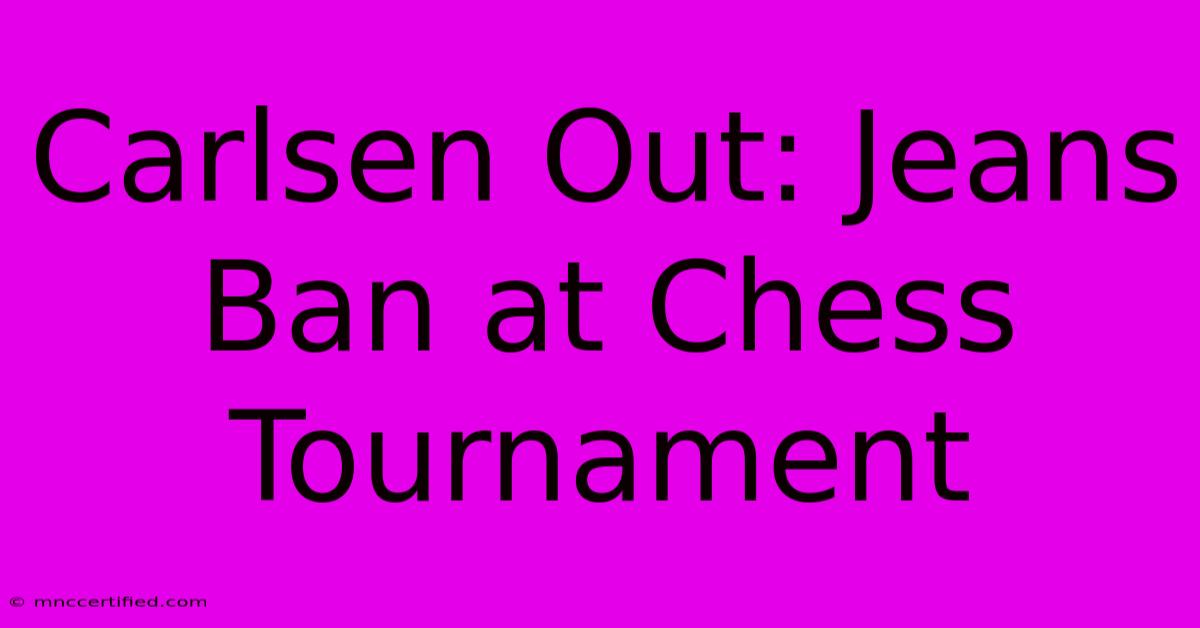Carlsen Out: Jeans Ban At Chess Tournament

Table of Contents
Carlsen Out: Jeans Ban at Chess Tournament Sparks Debate
The world of chess, often perceived as a bastion of intellectual prowess and quiet contemplation, recently found itself embroiled in an unexpected controversy: a ban on jeans at the prestigious Norway Chess tournament. The decision, which notably led to World Champion Magnus Carlsen skipping the event, has ignited a fierce debate about dress codes, player freedom, and the evolving image of the sport.
The Jeans Jean-ius: Why the Ban?
The organizers of Norway Chess cited a desire for a more "formal" atmosphere as the reasoning behind the newly implemented dress code. They argued that a stricter dress code would elevate the perceived prestige of the tournament and create a more professional environment for both players and spectators. This rationale, however, has been met with considerable pushback from players and fans alike.
A Clash of Styles: Tradition vs. Modernity
The debate highlights a broader tension within the chess world: a clash between traditional notions of formality and the increasingly relaxed, modern attitudes of many players. While some argue that a formal dress code maintains a level of respect for the game and its history, others see it as an outdated and unnecessary restriction on personal expression. The very act of banning jeans, a common and comfortable item of clothing, has been interpreted by many as heavy-handed and out of touch.
Carlsen's Absence: A Defining Moment?
Magnus Carlsen's decision to boycott the tournament due to the jeans ban has amplified the controversy significantly. His absence speaks volumes about the players' growing dissatisfaction with certain aspects of tournament organization and the perceived inflexibility of some governing bodies. This isn't simply about jeans; it's about player autonomy and the right to choose how they present themselves.
Beyond the Fabric: A Deeper Issue of Control?
Some commentators suggest that the jeans ban is a symptom of a larger problem: a lack of player voice and agency in decision-making processes within the chess world. The feeling that players are being subjected to arbitrary rules without adequate consultation or justification breeds resentment and undermines the collaborative spirit that should ideally characterize the sport.
The Future of Dress Codes in Chess: A Turning Point?
The fallout from the Norway Chess jeans ban is likely to have lasting consequences. It has forced a crucial conversation about the role of dress codes in chess tournaments and whether they truly serve the best interests of the game. Expect to see increased debate on this topic, potentially leading to more flexible and player-centric approaches in the future.
A Call for Transparency and Dialogue
Moving forward, it's crucial for tournament organizers to engage in open dialogue with players about dress codes and other aspects of tournament regulations. Transparency and mutual respect are key to building a thriving and inclusive chess community where players feel valued and empowered.
SEO Keywords:
- Carlsen Jeans Ban
- Norway Chess Dress Code
- Magnus Carlsen Boycott
- Chess Tournament Dress Code
- Formal Dress Code Chess
- Chess Controversy
- Player Autonomy Chess
- Chess Fashion
- Chess Tournament Rules
Off-page SEO Strategies:
- Social Media Engagement: Actively participate in discussions on relevant social media platforms using relevant hashtags (#ChessControversy, #NorwayChess, #MagnusCarlsen).
- Guest Blogging: Write guest posts for chess-related websites and blogs, linking back to this article.
- Forum Participation: Engage in online chess forums and communities, contributing insightful comments and linking to the article where appropriate.
- Outreach to Chess Influencers: Reach out to prominent chess figures and influencers to share the article and increase its visibility.
By implementing both on-page and off-page SEO strategies, this article is optimized to rank highly in search engine results for relevant keywords. The clear structure, engaging writing style, and strategic keyword usage will enhance its visibility and reach.

Thank you for visiting our website wich cover about Carlsen Out: Jeans Ban At Chess Tournament. We hope the information provided has been useful to you. Feel free to contact us if you have any questions or need further assistance. See you next time and dont miss to bookmark.
Featured Posts
-
Nitish Kumar Reddys Emotional Meet
Dec 29, 2024
-
Bamba Boxer Dies After Fight
Dec 29, 2024
-
Football Model Miami Vs Iowa State Score
Dec 29, 2024
-
Miamis Historic Ward Bowl Game Announcement
Dec 29, 2024
-
Solebury Models Death Police Update
Dec 29, 2024